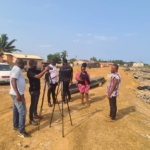General
Assembly Member urges media coalition to become long-term partner in rural sanitation drive
Gabriel Kwabla Kwatsikor, Assembly Member for Dziehe-Ablame Electoral Area, has called for a sustained partnership with the Media Coalition against Open Defecation to tackle long-standing sanitation challenges in rural Ghana. Speaking during M-CODE’s WASH Week 2025 visit to his constituenc...
MyJoyOnline
published: Aug 22, 2025


Gabriel Kwabla Kwatsikor, Assembly Member for Dziehe-Ablame Electoral Area, has called for a sustained partnership with the Media Coalition against Open Defecation (M-CODE) to tackle long-standing sanitation challenges in rural Ghana.
Speaking during M-CODE’s WASH Week 2025 visit to his constituency, Kwatsikor stressed that while one-off awareness campaigns are helpful, they are insufficient to address the deep-rooted sanitation crisis affecting his six communities and many others across the region.
“We Need You as Permanent Partners”
“We cannot solve these problems alone,” Kwatsikor told coalition members. “What we need is not just a visit, but a permanent partnership where M-CODE works with us hand-in-hand to build the infrastructure and systems our communities desperately need.”
Kwatsikor’s appeal proposes a new model of engagement, where media organisations act not just as observers but as active development partners.
“We have seen what your presence can do in just one weekend,” he noted, referring to the positive response to M-CODE’s recent activities in the Afia community. “Imagine what we could achieve if this collaboration were sustained over months and years.”

Community Voices Support the Vision
Residents have thrown their support behind the Assembly Member’s call.
“These media people have shown us that outsiders care about our problems. We want them to stay and work with us, not just talk about us and leave,” said Madam Comfort Agbeko, a trader in Afia.
Elder Kofi Mensah of the traditional council added: “We have the bylaws, we have the commitment, but we need partners who understand both our challenges and our potential. M-CODE has shown they understand.”

A Shift in Media’s Role
Kwatsikor envisions M-CODE as a bridge between communities and potential development partners, leveraging its network to secure funding, technical support, and long-term advocacy for sanitation solutions.
Specifically, he urged M-CODE to assist in: Resource mobilisation: Helping communities secure funding for household toilet construction.
Technical partnerships: Linking local authorities with sanitation experts and NGOs.
Sustained advocacy: Keeping sanitation issues in the public spotlight beyond WASH Week.
Knowledge sharing: Connecting communities to successful case studies and solutions.
A Replicable Model
Kwatsikor is already reaching out to fellow Assembly Members in other districts to build a regional network of community-media partnerships.
“If M-CODE can work with five or six Assembly Members across the Volta Region, we can create a network of communities supporting each other,” he suggested. “What works in Afia can be adapted for Mepe, what succeeds in Anloga can be tried in Ho.”
Beyond Advocacy
While M-CODE has traditionally focused on raising awareness, Kwatsikor’s proposal challenges the coalition to evolve into a development facilitator.
“We’re not asking you to build toilets with your own money,” he clarified. “We’re asking you to help us tell our story in ways that bring resources to our communities.”
The Stakes
With open defecation still rampant and environmental degradation threatening water sources, Kwatsikor says time is running out.
“Our children are getting sick, our rivers are contaminated, and our dignity is compromised,” he warned. “We need partners who will stay with us through the hard work of building solutions, not just documenting problems.”
As WASH Week 2025 concludes, the call is clear: for rural communities like Dziehe-Ablame, the future of sanitation may hinge on whether the media can transform from chroniclers of problems to catalysts for change.
Read More